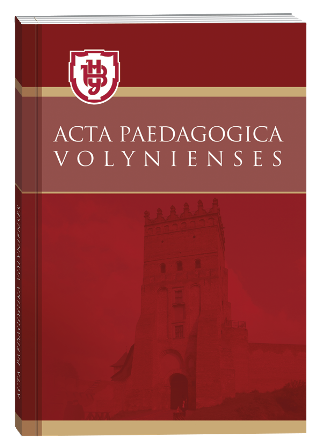EMOTIONAL INTELLIGENCE AS A COPING RESOURCE IN ENSURING SUCCESSFUL SELF-PROJECTION OF AN INDIVIDUAL
DOI:
https://doi.org/10.32782/apv/2025.2.22Keywords:
emotional intelligence, emotional competence, coping resources, pedagogical qualimetric approach, SWOT-analysis, transformation, competitionAbstract
The article is devoted to the consideration of aspects of the development of the creative potential of an individual, the structure of which includes emotional intelligence. Its role in education is becoming increasingly important. Structurally, it is difficult to study and research. However, the mutual influence of the rational and the emotional, the connection between thinking and emotions, the interaction of mind and feelings arouse the interest of scientists in considering various aspects of emotional intelligence. The purpose of the study is to analyse and systematise the approaches of foreign and domestic scholars to the problem of emotional intelligence; to reveal the content, structure, and development of the author's model of emotional intelligence; to highlight the importance of successful self-design of the individual. The paper presents the definitions proposed by the following scholars: G. Eysenck, D. Goleman, J. Meyer, P. Salovey, O. Chebykin, and others. The concepts of ‘potential’, ‘creative potential’, ‘self-control’, ‘transformation’, ‘competition’, ‘competitive struggle’, ‘modern market’ are singled out and presented. It has been found that constructive strategies, mobilisation of potential resources, experience, level of awareness and management of one's own emotions are identical to the level of development of the individual's creative potential. The development of emotional intelligence as a coping resource in ensuring successful self-design and self-control is considered. The regularity of the unity of intelligence and emotions for the successful organisation of managerial functioning is proved. It is determined that the conscious competent management of the development of the creative potential of an individual is the basis for making effective management decisions aimed at solving current and tactical tasks. The importance of self-control, which affects the processes of goal-setting, decision-making, and implementation of the plan, is defined in detail. The author's model of emotional intelligence development is developed. In particular, examples of J. Guilford's ‘structure of intelligence’, R. Bar-On, K. Spearman, R. Kettel and L. Thurstone's models are given. Emotional intelligence is considered as a competence aimed at interpreting the emotions of personal and other people. The article considers the qualimetric approach to studying the level of development of teachers' creative potential. The importance of developing a qualimetric model and tools for diagnosing this level in relation to the dynamics of personality transformation by managers of general secondary education institutions (GSEE) is proved. The importance of further research on the peculiarities of emotional intelligence development, development of diagnostic tools for the formation of leadership qualities, communication skills, self-control skills, and improvement of the overall quality of education is emphasised.
References
Волик С. Конкуренція: наукові підходи до визначення при побудові систем управління конкурентоспроможністю підприємств. Економічний простір. 2023. С. 73–78. URL: https://prostir.pdaba.dp.ua/index.php/journal/article/view/1352/1302
Гладкова В. Акмеологічна компетентність менеджера-лідера освітнього закладу. С. 1-11. URL: https://elibrary.kubg.edu.ua/id/eprint/24033/1/Gladkova_F.pdf
Гнатко Н. Феномен креативності як психологічна проблема. Психологічні перспективи. Луцьк, 2001. С. 88-97.
Дикань В. Національна модель індустріального розвитку країни: організаційно-управлінський аспект. Економіка та управління національним господарством. 2023. С. 11–34. URL: file:///C:/Users/cozyw/Downloads/287044-%D0%A2%D0%B5%D0%BA%D1%81%D1%82%20%D1%81%D1%82%D0%B0%D1%82%D1%82%D1%96-662436-2-10-20241224.pdf
Економічний словник. С.1. URL: https://ekonomichnij-slovnik.slovaronline.com/926-%D0%BA%D0%B2%D0%B0%D0%BB%D1%96%D0%BC%D0%B5%D1%82%D1%80%D1%96%D1%8F
Зарицька В. Емоційний інтелект: аналіз наукових теорій. 2010. С. 17–22. URL: http://tpsp-journal.kpu.zp.ua/archive/1_2010/6.pdf
Короід Т. Педагогічна кваліметрія в комплексному управлінні якістю. Інноваційна педагогіка. 2025. Випуск 79. Том 2. С. 192–197. URL: http://innovpedagogy.od.ua/archives/2025/79/part_2/40.pdf
Короід Т. В. Управління розвитком творчого потенціалу вчителів української мови і літератури : дис. ... д-ра філософії: 05.09.24. Київ, 2024. 306 с.
Кравченко Н. Глобальні детермінанти трансформації конкурентних відносин. 2018. С. 42–47. URL: http://www.visnyk-econom.uzhnu.uz.ua/archive/19_2_2018ua/11.pdf
Марчук С. Теоретичний аналіз поняття емоційного інтелекту в психології. С. 20–23. URL: http://psy-visnyk.uzhnu.uz.ua/index.php/psy/article/view/22/120
Моторнюк У., Крохмальна Я. Емоційний інтелект у системі управління персоналом: структура та проблеми оцінювання. Менеджмент та підприємство в Україні: етапи становлення та проблеми розвитку. 2022. № 2 (8). С. 52–60. URL: https://science.lpnu.ua/sites/default/files/journal-paper/2022/dec/29504/220972maket-56-64.pdf
Особистість як суб’єкт подолання кризових ситуацій: психологічна теорія і практика: монографія: Суми, 2017. Вид-во СумДПУ імені А. С. Макаренка. 540 с.
Циганчук Т. Емоційний інтелект у структурі стресостійкості студентів. С. 200-204. URL: https://elibrary.kubg.edu.ua/id/eprint/22260/1/T_Tsyhanchuk_NVP_2_ILPP.pdf
Чебикін О., Павлова І. Становлення емоційної зрілості особистості. Одеса, 2009. 238 с. URL: http://dspace.pdpu.edu.ua/bitstream/123456789/103/1/%D0%A1%D1%82%D0%B0%D0%BD%D0%BE%D0%B2%D0%BB%D0%B5%D0%BD%D0%BD%D1%8F%20%D0%B5%D0%BC%D0%BE%D1%86%20%D0%B7%D1%80.%2C%20%D0%9F%D0%B0%D0%B2%D0%BB%D0%BE%D0%B2%D0%B0.pdf
Eysenck, H. A model for intelligence. Springer-Verlag, Berlin Heidelberg. 1982, 269 p. URL: https://hanseysenck.com/wp-content/uploads/2019/12/1982_eysenck_-_model_for_intelligence.pdf
Koroid T. V. Model for managing the development of creative potential of teachers of ukrainian language and literature as a dynamics of personality. Zhytomyr, 2024. Р. 94–106. URL: http://pedagogy.visnyk.zu.edu.ua/article/view/318707/310226
Mayer J. D. Personality moderates the effects of a ffects on cognition. Toronto: Hogrete. 1988. P. 87–99.
Mayer J. D., Di Paolo M., Salovey P. Perceiving affective content in ambiguous visual stimuli: a component of emotional intelligence. Journal of Personality Assessment. 1990. P. 772–781.







